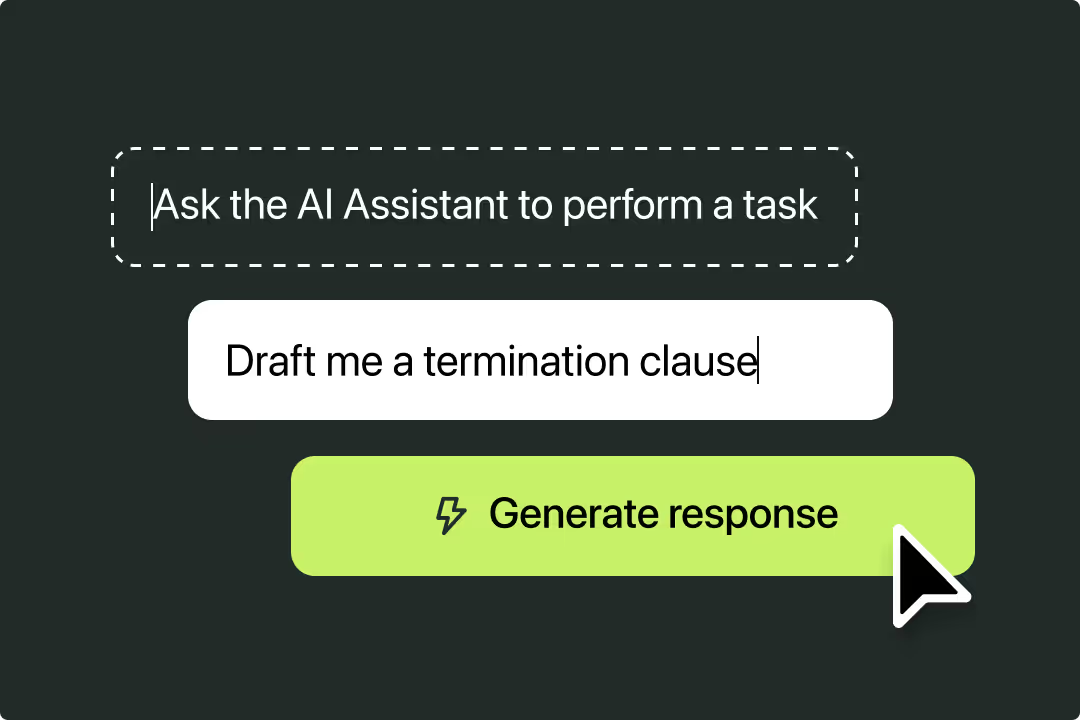Solutions
Customer Support
Resources
The clauses within your contracts will either make them or break them. Are you well-versed in the clauses you need to include and the purposes they serve?
Behind every successful business partnership lies a well-structured contract – and beneath every well-structured contract lies key clauses that shape these agreements.
Clauses are the most important elements of a contract. From confidentiality commitments to payment terms, they define how businesses collaborate and protect both parties when challenges arise.
In this guide, we'll cover the contract clauses that matter most for modern businesses. We'll explore what they mean in plain English, why they deserve attention, and how businesses can use technology to manage them more effectively.
A contract clause is a specific provision or section within a contract that outlines a particular term, condition, or obligation.
Clauses define the rights, responsibilities, and limitations of the parties involved in the agreement. Each clause addresses a distinct aspect of the contract, ensuring that key areas of the business relationship are clearly articulated and enforceable.

Collectively, these clauses form a contract that governs the entire relationship (if executed well).
But what do these clauses look like in practice? Let's explore some contract clause examples now.
While every agreement is unique, certain clauses appear again and again – and with good reason. Let's explore the key clauses in a contract and, more importantly, what they mean for your business relationships.
A confidentiality clause protects sensitive business information shared during a commercial relationship.
However, it's more than just a promise to keep information private. A well-drafted confidentiality clause defines what counts as confidential information, how it can be used, who it can be shared with, and how long the obligation lasts.
These clauses are so important because they protect everything from customer lists to pricing strategies – the kind of information that could harm your business if it fell into the wrong hands.
Example wording: "The receiving party agrees to keep all Confidential Information strictly confidential and will not disclose it to any third party without the disclosing party's prior written consent. Confidential Information includes, but is not limited to, business plans, customer data, pricing strategies, trade secrets, and any information marked as 'confidential.' This obligation continues for [5] years after this agreement ends."
Want more comprehensive terms on confidentiality? Check out this free confidentiality agreement template, and discover when to use an NDA vs a confidentiality agreement
Intellectual property (IP) clauses establish who owns what, both before and after the contract. They define ownership of any new innovations, content, or ideas created during the project.
These clauses prevent costly ownership disputes down the line by clearly stating whether IP is being transferred, licensed, or remains with its original owner.
For creative industries and technology companies, this clause can be the most valuable part of the entire contract.
"IP is one area where legal can directly influence revenue - for example, by protecting IP and facilitating new licensing opportunities" - Faye Moran, Senior Legal Operations Manager
Example wording: "Any intellectual property created by the Service Provider during the provision of services under this agreement ('New IP') becomes the exclusive property of the Client upon payment. The Service Provider agrees to sign any documents necessary to transfer ownership of New IP to the Client. Any pre-existing intellectual property remains the property of its original owner."
Curious about how to best protect your intellectual property? Explore this guide to IP management, or use this intellectual property assignment agreement template.
This clause sets boundaries around financial responsibility if something goes wrong. It might cap damages at a certain amount or exclude certain types of losses altogether.
While nobody enters a contract expecting problems, limitation of liability clauses provide crucial protection for both parties. They make risks more predictable and insurable, which is essential for any significant business relationship. These are also known as a form of exemption clause.

Example wording: "Neither party's liability under this agreement will exceed the total amount paid or payable under this contract in the 12 months before the incident. Neither party will be liable for any indirect, special, or consequential losses, including lost profits or business opportunities. This limitation does not apply to losses caused by fraud or willful misconduct."
Termination clauses outline how and when either party can end the contract. They cover everything from standard notice periods to situations warranting immediate contract termination. A good termination clause balances flexibility with stability, letting businesses exit when necessary while preventing contracts from ending due to arbitrary or unfair reasons.
Example wording: "Either party may terminate this agreement by giving 30 days' written notice to the other party. Either party may terminate immediately if the other party: (a) breaches any material term of this agreement and fails to remedy that breach within 14 days of being notified; or (b) becomes insolvent or enters into bankruptcy proceedings."
French for "superior force," this clause addresses what happens when unexpected events make it impossible to fulfill contractual obligations. From natural disasters to global pandemics, force majeure clauses provide a framework for handling the unexpected and discharging a contract.
Example wording: "Neither party will be liable for any failure to perform due to events beyond their reasonable control, including but not limited to natural disasters, war, pandemic, government actions, or widespread telecommunications failures. The affected party must notify the other party within 48 hours of such an event and resume performance as soon as possible."
Nobody wants to end up in court, which is why dispute resolution clauses are so vital. They establish a clear process for handling disagreements about contracts, often requiring mediation or arbitration before litigation. These clauses can save businesses significant time and money by providing a structured approach to resolving conflicts.
Example wording: "The parties will attempt to resolve any dispute through good faith negotiations for at least 30 days. If unsuccessful, the parties agree to try mediation before a mutually agreed neutral third party before pursuing litigation. Any legal proceedings must be brought in the courts of [jurisdiction]."
Payment clauses go beyond just stating a price. They outline payment schedules, late payment consequences, and any conditions that need to be met before payment is due. Clear payment terms prevent misunderstandings and help businesses maintain a healthy cash flow.
Example wording: "The Client shall pay all invoices within 30 days of receipt. Late payments will incur interest at 2 per cent per annum above the base rate. The Service Provider reserves the right to suspend services if any payment remains unpaid for more than 45 days after the due date."

Renewal clauses specify if and how an agreement can continue beyond its initial term. They outline automatic renewal conditions, notice periods for preventing renewal, and any changes that might apply in subsequent terms. A well-crafted renewal clause helps businesses maintain valuable relationships while providing flexibility to adjust terms when needed.
Example wording: "This agreement will automatically renew for successive 12-month periods unless either party gives written notice of non-renewal at least 60 days before the end of the current term. Upon renewal, fees may increase by up to 5 per cent of the previous term's rates. Any other modifications to renewed terms must be agreed in writing by both parties at least 30 days before renewal."
Want more advice on tackling renewals? Read this guide to renewal management in 2026.
Indemnification clauses protect against third-party claims and potential losses. They specify who takes responsibility for various risks and how costs will be covered if something goes wrong.
While the term might sound like complex legal language, indemnity clauses essentially answer a simple question: "Who pays if something goes wrong?"

Example wording: "The Supplier agrees to indemnify, defend, and hold harmless the Client against any claims, damages, losses, and expenses (including reasonable legal fees) arising from: (a) breach of this agreement; (b) negligence or willful misconduct; or (c) any third-party claim that the services infringe their intellectual property rights."
Arbitration clauses provide an alternative to costly court proceedings. They require parties to resolve disputes through arbitration – a private process where an independent arbitrator makes a binding decision. These clauses often specify the arbitration rules, location, and number of arbitrators.
Example wording: "Any dispute arising from or relating to this agreement will be resolved by binding arbitration under the rules of [Arbitration Body] by a single arbitrator in [Location]. The arbitrator's decision will be final and binding on both parties. The costs of arbitration will be shared equally unless the arbitrator determines otherwise."
Understanding key contract clauses is essential, but knowing how to implement them effectively is equally important. Many organizations make critical mistakes when drafting and managing their contract clauses, leading to unnecessary risks and complications. Here are some of the most common pitfalls:
Digital solutions are transforming clause management, making it easier for teams to create rock-solid contracts that include the correct clauses worded in the correct manner.
Instead of hunting through old documents or relying on memory, teams can use contract management platforms to access centralized clause libraries.
For example, Juro's automated contract templates enable the legal team to set pre-approved clauses that reflect your business's legal requirements and preferences. These are automatically inserted, adapted, or removed depending on the size, nature, and risk involved in the contract.
The result? More consistent contracts and fewer risky deviations from standard language. That roughly translates to fewer sleepless nights for legal, and faster turnaround times for the rest of the business.

AI has further revolutionized how teams create and review contracts. Smart technology automatically suggests standardized clauses to include while during contract creation, reducing the time spent on manual drafting.
Juro's AI Assistant takes this further by ensuring clauses remain compliant with company standards while enabling quick customization when needed.

And it isn't just about drafting the contract clauses in your legal agreements. Juro also makes it easier than ever to enforce them.
When contracts come up for renewal, teams no longer need to manually track contractual obligations. Tools like Juro provide proactive alerts about deadlines linked to specific clauses.
Juro's automated reminder system keeps teams ahead of key dates like renewals and payment milestones, ensuring important obligations don't slip through the cracks.
Contract clauses form the foundation of business relationships – but they're only as good as your ability to manage them effectively.
As contracts become more complex and deal volumes grow, the old way of handling clauses through static documents and manual tracking simply isn't sustainable. Modern businesses need modern solutions.
Ready to transform how you manage contracts? Fill in the form below to speak to a specialist about Juro.

Lorem ipsum dolor sit amet, consectetur adipiscing elit. Suspendisse varius enim in eros elementum tristique. Duis cursus, mi quis viverra ornare, eros dolor interdum nulla, ut commodo diam libero vitae erat. Aenean faucibus nibh et justo cursus id rutrum lorem imperdiet. Nunc ut sem vitae risus tristique posuere.

